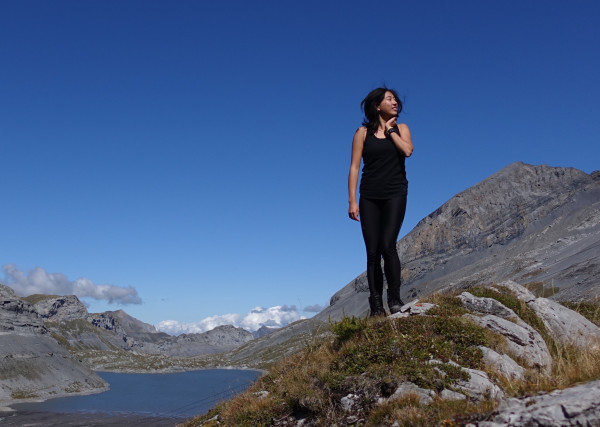Noémie Xiao Hu
Interview by Nicola Nosengo, NCCR MARVEL in May 2023.
Have you always been interested in science?
I think so. I come from a family where both my parents were scientists, and science always felt very natural. As a kid I was very curious about natural phenomena, in things like how clouds form. I read a lot of science books for children, and as a kid I already said I wanted to be a chemist in the future. It was a bit less clear during my teenage years, when I became very interested in arts and sports. But in the end, I came back to science.
My journey to computational materials science was a long one, though. In my bachelor's I studied bioengineering, which in Belgium is very much focused on agriculture, environment and chemistry. That gave me a systemic approach and during that time I got a lot more conscious about the environment and sustainability, both through my courses and different encounters. I specialized in chemistry and decided to study chemical engineering at EPFL for my master. There I focussed on materials for energy, doing a research internship on catalysis and one in electrochemistry. Those two experiences made me a lot more interested in understanding the theory, and in being able to go from the small scale to the big scale, and all that led to the thesis in computational chemistry.

How did you hear about the INSPIRE Potentials Program?
I was lucky enough that it dropped into my mailbox as an EPFL chemical engineering student. I had never done computational work before, but it was a challenge I wanted to take, and it seemed like a great opportunity. I took a shot at it and luckily, I got accepted.
What is the topic of your master’s project?
The broader subject is CO2 capture using Metal Organic Frameworks, through physical adsorption. What I am trying to do in my thesis is develop the ability to predict the CO2 uptake by any structure at any given temperature, pressure and stream compositions. I use a mix of machine learning, molecular simulation and theoretical work on absorption. Luckily the molecular simulation part is quite mature and it’s more a matter of doing the experiments at the right condition. The machine learning part is something that I am implementing now and that I am learning from scratch. Luckily there are very good courses at EPFL that help me both in applying ML and in understanding the logic behind it. I am quite comfortable with Python, which really helps.
Do you think women face specific challenges in the sciences?
It is quite intimidating for women to go into science, partly because it’s hard to find role models and thus to feel that they would belong in a scientific field. Many women go into biology or chemistry, but there are fewer ones in physics and engineering which are viewed as tougher to study and more challenging and are typically more male-dominated. And I think many women do not feel confident enough about being able to “survive” the program, and those worries also affect their performance and their ability to focus. Men have more role models, and they don’t have to worry that they don’t fit in. It has a lot to do with education, where women are more often taught to accommodate for others and end up not taking their space. Already in secondary school you notice that boys will tend to ask more questions to the teachers and get more attention, and in the end, this means less opportunities to learn for girls. It’s important to be aware of such bias, so that we can educate girls to take up a bit more space, and at the same time educate boys to make more space for girls.
Any advice for young girls interested in science?
I would say to not be intimated to take space, and especially when they feel they don’t have it, which can be quite an overwhelming feeling. Raise your hand, ask questions, annoy your teachers – they won’t be annoyed, they’re there to help! Another aspect that is very important is to support other girls who are interested in science. Especially in fields where there are not that many women there is a strong link of sorority which can be very empowering
In terms of acquiring skills, I believe challenging yourself early to learn the more difficult subjects really helps to build a good foundation and be able to be more flexible afterwards. For example, it helped to learn to code early and be able to develop those skills bit by bit. But the most important thing is staying curious, always being willing to learn new things. and having a diverse approach. For me, having learned about agriculture or food chemistry helps me remember that there are other things out there in addition to what I am focusing on now, and that everything is connected. This systemic view is very important to me.
What are your plans for the future?
I am still unsure. I would like to stay in academia and do a PhD, even though in the future I may see myself more in the industry. My main goal is to contribute to a more sustainable world, and I feel I could have a more tangible impact in the industry. But I also want to advance research and tools to investigate materials. I am also very involved in different associations, and I want to be involved in sustainability through my job but also through activism and community work.
